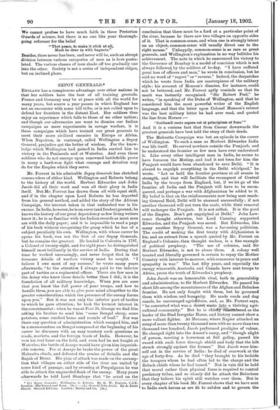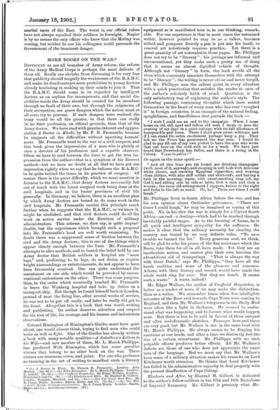SEPOY GENERALS.* ENGLAND has a conspicuous advantage over other nations
in that her soldiers have the best of all training grounds. France and Germany may be at peace with all the world for many years, but scarce a year passes in which England has not an encounter with some hill tribe, or is not called upon to defend her frontiers in the distant East. Her soldiers thus enjoy an experience which falls to those of no other nation; and though our adversaries are wont to dismiss our Indian campaigns as mere experiments in savage warfare, it is these campaigns which have trained our great generals to meet their more civilised enemies in Europe or Africa. When Napoleon, in contempt, called Wellington a Sepoy General, prejudice got the better of wisdom. For the know- ledge which Wellington had gained in India carried him to victory in the Peninsula and at Waterloo. And even those soldiers who do not emerge upon renowned battlefields prove in many a hard-won fight what courage and devotion may do for the Empire which they serve.
Mr. Forrest in his admirable Sepoy Generals has sketched commLnders of either kind. Wellington and Roberts belong to the history of the world. Herbert Edwardes and- John Jacob did all their work and won all their glory in India itself. But Mr. Forrest has drawn them all with equal skill, and if in the chapter upon Lord Roberts he has departed from his general method, and added the story of the African Campaign, the interest taken in that unfinished war is his excuse. In India, however, he is on surer (and fresher) ground; he knows the history of our great dependency as few living writers know it; he is as familiar with the Indian records as most men are with the daily paper; and it is impossible to read a page of his book without recognising the grasp which he has of a subject peculiarly his own. Wellington, with whose career he opens his book, was not the first of our Sepoy Generals, but he remains the greatest. He landed in Calcutta in 1797, a Colonel of twenty-eight, and for eight years he distinguished himself most brilliantly in the service of India. During that time he worked unceasingly, and never forgot that in the tiresome details of warfare victory must be sought. "I believe I owe most of my success," he wrote many years afterwards, "to the attention I always paid to the inferior part of tactics as a regimental officer. There are few men in the Army who knew these details better than I did; it is the foundation of all military knowledge. When you are sure that you know' the full power of your troops, and how to handle them, you are able to give your mind altogether to the greater considerations which tee presence of the enemy forces upon you." But it was not only the inferior part of tactics to which he gave attention; he took the keenest interest in the commissariat : when he was at Fort St.. George we find him asking his brother to send him some Bengal sheep, some potatoes, some smoked hams and rounds of beef." Nor was there any question of administration which escaped him, and in a memorandum on Bengal composed at the beginning of his career he discusses with an easy mastery such questions as roads, markets, and the foreign trade of India. However, he won his real fame on the field, and even had he not fought at Waterloo, the battle of Assaye would have given him imperish- able renown. For at Assaye he broke the power of the great Mahratta chiefs, and defeated the armies of Scindia and the Rajah of Berar. His plan of attack was made on the assump- tion that villages on either side of the river are united by some kind of passage, and by crossing at Peepulgaum he was able to attack the unguarded flank of the enemy. Many years afterwards he told Lord Stanhope that "he acted on the • (1.) Seim Generals: Welling:fon to Roberts. By G. W. Forrest, C.LE. London: Blackwood and Sons. [6s.]—(2.) General John Jacob. By A. nines Shand. Second Edition. London : Seeley and Co. Lead conclusion that there must be a ford at a particular point of the river, because he there saw two villages on opposite sides of it. That is common-sense, and when one is strongly intent on an object, common-sense will usually direct one to the right means." Unhappily, common-sense is as rare as great generals, and Wellington's explanation in no way belittles his achievement. The note in which he announced his victory to the Governor of Bombay is a model of concision which is not always followeil by the soldiers of to-day. "I have suffered great loss of officers and men," he wrote in conclusion, but he said no word of " regret " or "reverse." Indeed, the despatches which he wrote from India are masterpieces of the military style : his account of Monson's disaster, for instance, could not be bettered, and Mr. Forrest aptly reminds us that its merit was instantly recognised. "Sir Robert Peel," he writes, "in speaking of the Duke of Wellington, said that he considered him the most powerful writer of the English language, and that the letter upon Colonel Monson's retreat was the best military letter he had ever read, and quoted the line from Horace :—
Scribendi recto sapere eat et principium et fons."
And it is a curious fact that from Caesar downwards the greatest generals have best told the story of their deeds.
The 3fahratta Campaign was but an episode in the career of Wellington. To such a man as Herbert Edwardes India was life itself. He served nowhere outside the Punjaub, and he understood the frontier as few men have ever understood it. Like every other intelligent man in India, he seems to have foreseen the Mutiny, and had it not been for him the Punjaub would have been abandoned to save Delhi. "It is absurd to engulph everything in the Delhi whirlpool," he wrote. "Let us hold the frontier province at all events in strength, and that will facilitate the reconquest of Central India by the troops from England, but, if we let go of the frontier, all India and the Punjaub will have to be recon- quered, and perhaps a war with Afghanistan be added to it. My belief is that on the reinforcements now being sent reach- ing General Reid, Delhi will be stormed successfully ; if not another thousand will not turn the scale, while their removal will endanger the Punjaub. It is not selfish. It is the good of the Empire. Don't get engulphed at Delhi." John Law- rence thought otherwise, but Lord Canning supported Edwardes, and the Punjaub was saved. But Edwardes, like many another Sepoy General, was a far-seeing politician. The credit of making the first treaty with Afghanistan is his, and an extract from a speech quoted by Mr. Forrest on England's Colonies, then thought useless, is a fine example of political prophecy. "The use of colonies, said Sir Herbert Edwardes, is not to abuse them. A colony well treated and liberally governed is certain to repay the Mother Country with interest to-morrow, with commerce in peace and sympathy in war." The last fifty years, and especially the energy wherewith Australia and Canada have sent troops to Africa, prove the truth of Edwardes's prophecy.
John Jacob was an honourable rival, both in generalship and administration, to Sir Herbert Edwardes. He passed his short life among the mountaineers of the Afghan and Beluchee frontier. He not only fought with them, but he governed them with wisdom and humpnity. He made roads and dug canals, he encouraged agricflture, and, as Mr. Forrest says, "he converted what was a desert waste into a thriving agri- cultural community? But he is chieflinnbered as the leader of the Sind Irregular Horse, and history cannot show a more valiant fighter. At Meeanee, where Napier attacked an army of more than twenty thousand men with no more than two thousand two hundred, Jacob performed prodigies of valour. He charged right into the Ameer's camp, and "though slight of person, meeting a horseman at full gallop, passed his sword with such force through shield and body that the hilt struck strongly against the former." But Jacob wore him- self out in the service of India: he died of overwork at the age of forty-five. As he died "they brought to his bedside the troopers whom he had often led to the charge and the Beluch chiefs whom he had tamed." Not in vain did he hold that moral rather than physical force is required to control predatory tribes, and so closely did he attach the Beluchees that they believe his spirit still watches over them. But in every chapter of his book Mr. Forrest shows that we have sent to India such heroes as are fit to subdue and to govern the martial races of the East. The worst is, our official rulers have not always equalled their soldiers in foresight. Napier is by no means the only officer who knew that the Mutiny was coming, but neither he nor his colleagues could persuade the Government of the imminent danger.







































 Previous page
Previous page